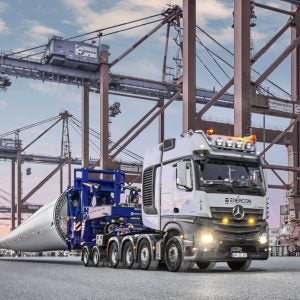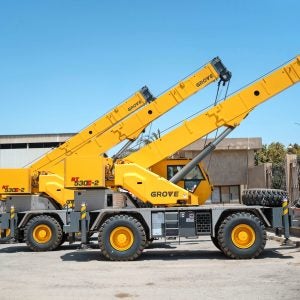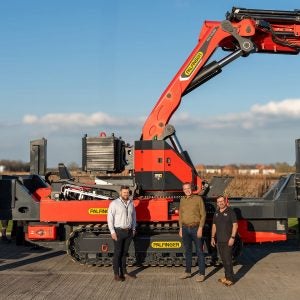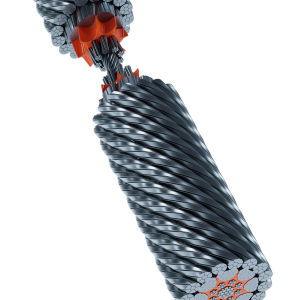Cranes Today met Philippe Cohet, Manitowoc’s executive vice president for Europe, the Middle East and Africa, at the division’s headquarters in Ecully, a leafy suburb of Lyon, France. Hidden away behind a genteel residential street, the 1970s block built by Potain founder Faustin Potain offers a nostalgic vision of modernism and technological optimism.
Inside the angular concrete ribs of the structure, Manitowoc’s European managers are working on a new view of the industry’s future, focusing on production efficiency, closeness to customers, and after sales service that stretches around the world.
Key to this is adopting the lean approach to manufacturing developed by automobile and airplane manufacturers. In lean, manufacturers don’t sit on warehouses full of parts, but ask suppliers to deliver them as needed. Products and components aren’t built speculatively, with the potential of being left in a yard, but to order.
Manitowoc started reorganising its production lines to this system during the boom. Cohet says: “Non-lean manufacturing is like the sea at high tide. Problems on the line are hidden below a sea of parts. When that sea of parts is lowered by adopting lean, every problem is revealed.
“Three years ago, when we talked about lean, the objective was to increase capacity at no cost. Lean helped do that at Shady Grove. Now, the target is operational excellence: lower stock, better quality, more productivity.”
One of the big problems faced by the crane industry has always been the cyclicality of construction. In peaks, manufacturers over extended themselves in a bid to keep up with demand, and then collapsed in the subsequent trough. Lean offers a way to be flexible about shaping a business to match demand.
Today’s market is very different from the 2007 peak; but, in parts of Cohet’s region, it is different too from the worst of the 2008 and 2009 trough: “You have to be careful every time you comment. I’ve been following the tower crane part of the business particularly, as we have so many assets there: plants in France, in Italy, and in Portugal. In Germany, Austria, Switzerland and Poland, the market has restarted. Whether for real estate or infrastructure projects, these markets use a lot of towers. There has been a nice relief, especially for self-erectors, since February and March this year.
“There’s a link to fleet size. In Germany, the market never boomed. When Manitowoc bought Potain, one of the expected benefits was very strong growth in Germany, but that never came. That means though that German users are now ready for new tower cranes, like selferectors and topless towers.
“France is relatively satisfactory; we’ve seen some restart of the business. These two tower crane markets, France and Germany, allow us to re-establish a solid base for the business.”
The decline in demand allowed Manitowoc space to implement lean at a number of facilities. Currently, for example, the company is creating a new winch production line at a facility in Charlieu, a couple of hours drive away from Ecully (of which, more next month). But, making production more efficient isn’t the only thing Manitowoc is doing to ready itself for a future boom.
“Very often,” Cohet says, “I’ve discussed with colleagues the competition we face from China. One dimension where they are behind is service. The technology gap between China and developed markets is declining. Now, China is not looking at our technology, but at our markets. Crane Care remains a differentiator for us.
“We created Manitowoc Crane Care nine years ago. The goal was to be able to service cranes anywhere in the world. New crane sales are down, so service is a nice source of revenue, particularly as people keep cranes for longer. As we enter emerging markets, further from our traditional base, Crane Care makes us better placed to get parts out there, and we can support dealers through training and software. It is paying off in emerging markets. We are still investing in Manitowoc Crane Care, still adding staff.”
Manitowoc’s new reach puts the third plank of the company’s strategy, getting close to customers, to the test. Here, Cohet has a natural advantage: “Getting closer to the market allows us to get a better picture of real drivers of demand in each market. I spend a lot of time in Saudi Arabia, in Algeria: it is important to travel, to see what is happening.
“Having a French speaker running the Potain brand’s operations in EMEA helps relationships with customers, in France, Switzerland, and in Algeria and Morocco. In a different way, it helps in the Middle East. Customers there like to deal with the Potain brand directly. It helps to be French, it means you represent Potain to them.”
Manitowoc’s attention to manufacturing detail, to service, and to customers’ needs, aims to transform the company ahead of the next boom. When will that come though? Cohet makes no promises: “Overall, 2010 will be challenging. For 2011, you still need a crystal ball.”






